Text
These are starter packs
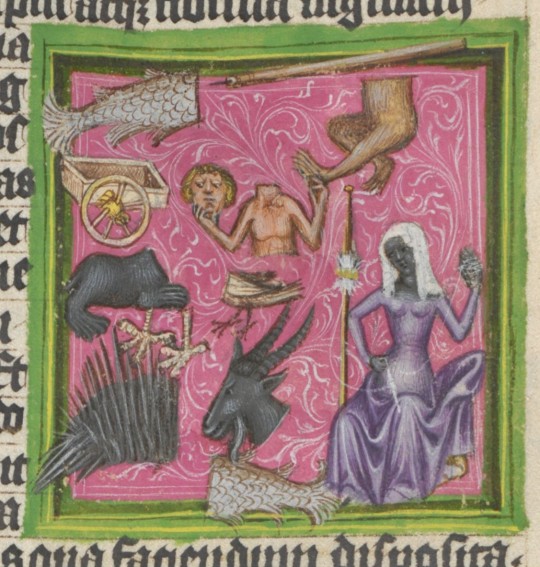

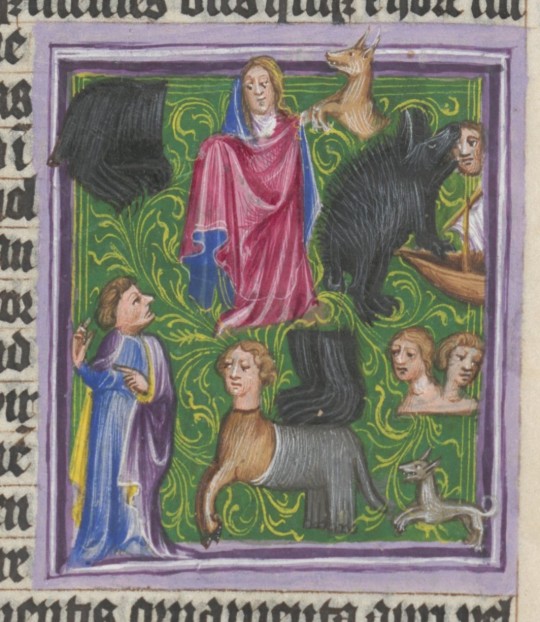
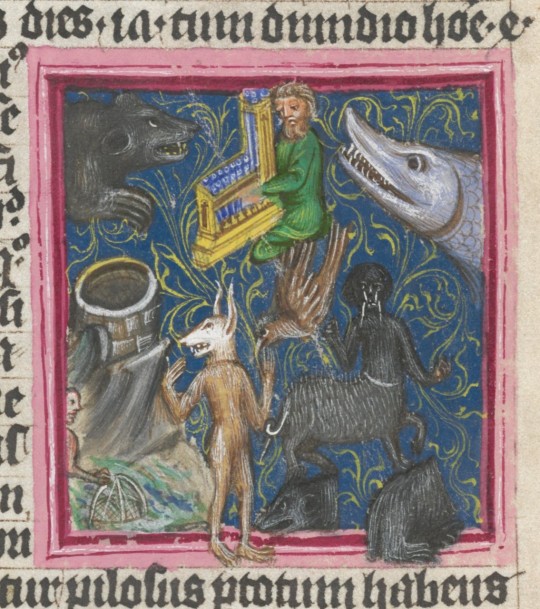
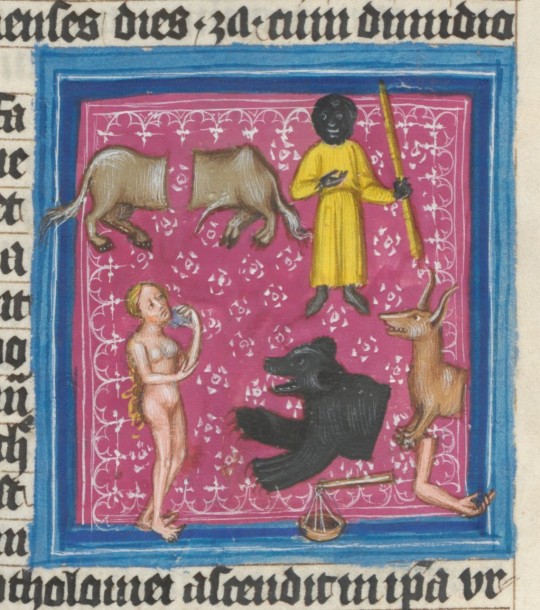
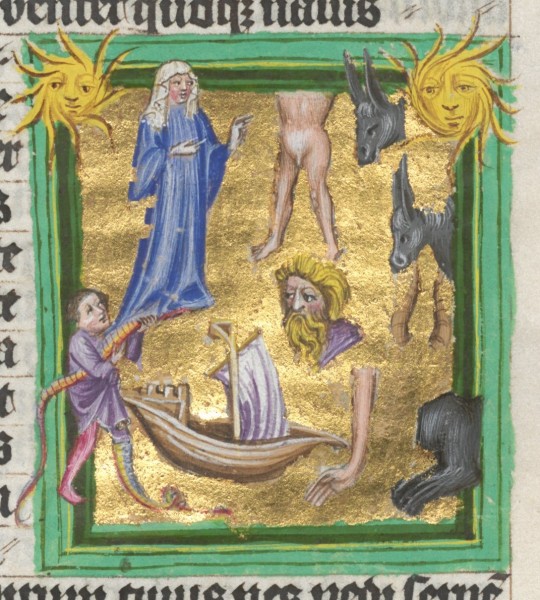
astronomical illustrations
from an astronomical-astrological codex for king wenceslaus iv. of bohemia, prague, shortly after 1400
source: Munich, BSB, Clm 826, fol. 13v-25v
449 notes
·
View notes
Text
Charms
Boring-posting I know; but some recent conversations and the importation of AD&D monsters with the power of Suggestion have suggested to me that I might rewrite these. Rereading the text in B/X reminds me of the use of the word “habits” there, a fine tool for adjudicating these spells.
Charm Person
Spell Level: Magic-user 1
Range: 120 ft.
Duration: Until dispelled
One living person no larger than an Ogre—such as goblin, elf, lizard-man or gnoll, or a mortal man or woman—falls under the Magic-user's influence if a saving throw is failed. Charmed folk still follow their nature and habits: only those accustomed to the outlaw's life and free of responsibility will join up with the magician as a follower indefinitely. Your maximum followers (Charisma) score determines the total number you can keep under charms at a time, whether with you or not.
Suggestion
Spell Level: Magic-user 3
Range: 30 ft.
Duration: until the task is complete
Compel one victim to carry out a task when it is said both authoritatively and with polite reasonableness. Persons subject to this magic cannot resist taking an immediate action they might already have considered in the situation, although they may resent the compulsion. Asking them to act against their nature or habits, or giving the Suggestion to a monster, compels a saving throw to avoid the curse. Those still acting under the Suggestion will not remember the spell unless it is broken.
Charm Monsters
Spell Level: Magic-user 4
Range: 120 ft.
Duration: Until dispelled
Bend all manner of being to your will, whether Giant, Dragon, or otherworldly spirit, unless they make a saving throw. The nature of Monsters is a reflection of their place in the world: treat with them on their terms to win indefinite service or bind them to a task. Against lesser foes of 3 or fewer HD, 3d6 may be affected.
0 notes
Text
In original and even more in AD&D this was called monster level, and to be fair it gets used in a different way for a looser dungeon-level balance.
But: if you don’t want levels to be an important determinant of what kind of play happens in your game, D&D and its cousins might not be the right game for you!
yk, I think I'm starting to actively dislike challenge rating as a concept.
"here's a monster that's totally cool conceptually. By the way, it's set up specifically to have balanced interactions with only characters of at least a specific level and to be forgettable if you're too far above that level'
giving things a CR diminishes them
274 notes
·
View notes
Note
hey CT, one of the ostriches at the Dallas zoo laid an egg at the moment the eclipse reached totality. is this a sign or portent of some sort? will it hatch a snake?
Basilisk...
2K notes
·
View notes
Text
Thinking about the werewolf from the hate mail Lemgo council pharmacist David Welman (1595 - 1669) got after being accused of being a werewolf
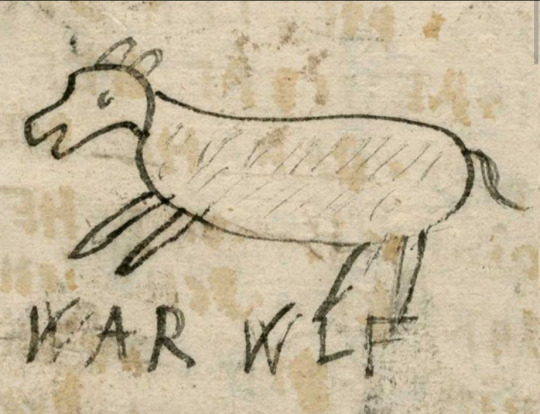
76K notes
·
View notes
Text
A post of mine from several months ago about the Perlesvaus self-rearranging forest just wandered across my dash again and made me think about it some more, so I wanted to talk about it a bit.
Perlesvaus, for those who don’t know, is a 13th-century French Arthurian romance. It’s intended to be a continuation of Chretien de Troyes’s Perceval, but it’s mostly known for being completely batshit when it’s known at all. (There’s an old book on Arthurian texts that dedicates a chapter to Perlesvaus and repeatedly speculates that the anonymous author had Something Wrong With Him. This is the longest scholarly treatment of Perlesvaus I’ve been able to find & read.)
Anyway, there’s an odd worldbuilding detail in the text. See, it’s a Thing in chivalric romances that the questing knights happen upon castles & lords & damsels & such that are unfamiliar to them and have to be explained. You know, “this is the Castle of Such-and-Such, where the local custom is as follows. It’s ruled by Lady So-and-So, whose character I shall now describe to you.”
This is a genre convention that largely goes unquestioned, but it’s a bit odd if you think about it. All these knights are at least minor nobility. They don’t know the other nobles in their region? They don’t know what castles are where? Don’t they have, like, diplomatic relations with these people or at least attend the same tournaments? Even if they’re all fully committed to the knight-errant lifestyle and don’t really engage in courtly diplomacy, you’d think they would share information with each other and get the lay of the land. But instead, to use TTRPG terminology, it’s like they’re all on a hexcrawl that was randomly generated just for them to have these adventures.
The author of Perlesvaus decides to address this. In what’s kind of a throwaway paragraph late in the text, he explains that God moves things around so knights always have new quests to do (and, presumably, is also making sure they always arrive at the right narratively-significant moment). So the reason they’re always encountering people & places they have no knowledge of is because those people & places really weren’t there yesterday. They didn’t know about the Castle of Such-and-Such because it’s normally a thousand miles away and the forest path they followed to get there used to lead somewhere else.
And I think that would be a really interesting thing to stick into a novel or a TTRPG or something. When a knight rides into the forest with the intent of Going On A Quest, at some point they go around a bend in the path, cross an invisible barrier, and wind up in the Forest of Narrative. This is a vast forest with no set geography, filled with winding paths and populated almost entirely with questing knights, damsels in search of questing knights, friendly hermits, strange creatures, and allegorical set-pieces. Then, at the narratively-appropriate time, they cross back over the invisible barrier back into the regular world, and find themselves wherever the Narrative has decided they need to be. This could be a different country, a different continent, or a different world entirely.
Whether anyone involved is actually aware that this is how it works is… optional, really. Though if it’s not a Known Phenomenon, the people whose jobs it is to handle trade & diplomacy & god forbid, maps, are going to end up tearing their hair out in frustration.
2K notes
·
View notes
Text
D&D's Obsession With Taxonomy
Like virtually everybody else in the TTRPG space I downloaded One D&D's playtest document to see what the fuss was.
One of the eyebrow-raising bits in that document is the boxed text titled "Children Of Different Humanoid Kinds":
"For example, folk who have a human parent and an orc or an elf parent are particularly common. Many other combinations
are possible ... Finally, determine the average of the two options’ Life Span traits to figure out how long your character might live. For example, a child of a halfling and a gnome has an average life span of 288 years."
Many people have problems with this passage. I can see why. But when I read it I laughed.
Of course D&D would handle this thing this way.
"Determine the average of the two options' Life Span traits to figure out how long your character might live"; the ludicrous math precision of "288 years"?
These bits are quintessential D&D.
+
"D&D is racist!" discourse returns again and again, like a pair of annoying missionaries.
(I've used this metaphor before. I'm pleased with it. I will repeat it as often as people repeat "D&D is racist!" discourse online.)
But a conversation that Flo began on Discord about the thoul has given me a way to talk about "D&D is racist!" in a way that doesn't bore me.
+
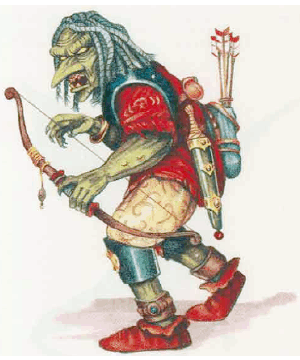
What is a thoul?
"Thouls are magical crosses between ghouls, hobgoblins, and trolls. In spite of their ghoulish blood, they are living creatures, not undead."
Gus points out that "thoul" is likely a typo -- "transcription error (first use of thouls replaces 'toads' as entry above 'ghouls' on table transferred from Monsters and a treasure to ready ref sheets)"
(Here's a fun link about the thoul's possible origins.)
The Discord conversation descends into laughter.
Flo: "I think D&D does not need as many humanoids as it has."
+
Here's my thought:
D&D is racist
is really:
D&D is obsessed with taxonomy
which is really:
Nerds are obsessed with taxonomy
+
People arguing over the differences between a wyvern and a dragon; or
People insisting that Tolkien made a categorical distinction between orcs and goblins (no, he did not, go read "Lord of the Rings" again); or
People arguing about whether "Star Wars" is science fiction or science fantasy, and then arguing about the boundaries of science fantasy; or
What Are The Differences Between High Fantasy And Low Fantasy
Etc, etc, etc.
All of the above cliche-nerd-arguments are about more-or-less arbitrary distinctions. The utility of these categories tend to be vastly overblown.
+
Categories are useful.
There is a distinction between performance art and the performing arts because they arise from separate traditions; ditto the many strains of music genre.
But these are useful precisely because they communicate a history of people exercising agency -- creators choosing to define themselves in relation to history / tradition / peers, letting those things define their work.
Categories are subjective actions, not objective facts.
+
What the nerd approach to taxonomy ("a dragon is NOT a wyvern!!!") does well is make a field of knowledge / phenomena predictable, quantifiable: "This is the way the world is."
Therefore fully understandable: "I know the world."
Therefore possible to act on: "I know what do with the world."
You can solve it, apply best practices to it, optimise it, own it, possess it.
Definitive taxonomies like "goblin / hobgoblin / bugbear" is better for you because then you can shorthand these creatures into three separate and discrete scripts.
Instead of: "goblin people come in a lot of different sizes -- some are big, some are puny, some are kind, some are not -- it all depends. You got to just pay attention to each one."
Which makes things messier, more unpredictable, meaning you have to pay attention, exercise discretion / empathy more, possibly accommodate new perspectives.
"I know the bugbear better than it knows itself, I got this."
vs
"Okay so how do I get to know Ms Goblin better?"
+
When I posted these thoughts to Discord, Marcia observed:
"The connection between taxonomy and power, that nerds find it empowering to possess an abstract knowledge which they impose onto things, seems related to what has been identified as phallic desire ..."
(Meaning that this blogpost should really be titled D&D's Obsession With Phallic Desire , for maximum clickbait -- but this is Marcia's thought, don't wanna steal her thunder!)
+
One advantage to quantifiable, objective, abstracted taxonomies in games:
It helps with logistics in play.
The mental load for players in TTRPGs is already so high -- at least it is for me, weak-brained nerd as I am; I need some shorthand just to help my imagination along.
BUT!
If helping with mental load was the purpose for D&D obsessive taxonomy -- it'd be way simpler than it now is???
Tracking all the split hairs between D&D FINAL EDITION's ten thousand different Conditions is empathically not making play easier.
+
Back to the thoul. Gus again:
"Thouls - my take is they are interesting as a set of mechanics - but incoherent as a creature. The need to justify their abilities via existing monsters makes then nonsensical- better just to have them be some sort of manifestation of goblin magic or science ... That D&D chose instead to taxonomize them says something about D&D."
+
The thoul's "part ghoul, part troll, part hobgoblin" thing is much like the "half-dradkin half-celestial ranger 5 / paladin 7" NPCs you see in mainstream RPG adventure-path-type books.
Which is much like: "determine the average of the two options’ Life Span traits" and "288 years".
Aesthetically and ethically incoherent; mechanically convoluted -- but absolutely sensical if your purpose is to safeguard access to a highly taxonomised "objective" worldview.
Nerds don't mind figuring out complicated fractions of abstract objective absolutes. Because this means you can still ultimately sort reality into absolutes.
You can still grasp (in all senses of the word) the world.
That thought is safer / more advantageous than: "yeah you just gotta deal with things being a messy soup, people are not lines of code, you gotta pay attention to everything in its own context."
+
This is turning out to be a post assisted by Discord chorus.
Re: the drive for taxonomy-based worldbuilding -- and concurrent to thoughts about how Non-Diegetic Objective Maps Are Naff Actually -- Ava:
"the whole "fantasy worldbuilding, with its concrete ontologies and god's eye histories and maps replicates + reifies colonial epistemology" was the whole deal of my thesis."
(Ava you need to write a blogpost about this thesis!)
Re: literal scientific taxonomy -- Dan:
"D&D's obsession with taxonomy is weirder to me than normal taxonomic obsessions because of how hard it tries to ape natural sciences and then leaves out every possible interesting thing actually studying ecology could lead to."
Which sparked a discussion about the politics of binomial nomenclature, how there's a great deal of re-classification going on in scientific fields.
Syd:
"there’s actually been a lot of big reshuffles that have come out of the fact that people realized certain classifications had been from phenotypical similarities (physical characteristics) but not genotípicas relationships. And even when it isn’t political in the sense of changing names that we’re given as honorifics there’s actually a huge pushback just from people who think it shouldn’t change bc that’s historically how it was, even if it doesn’t fit our current models of what taxonomy is actually useful for in ecology and biology."
Something something, categories are subjective actions, not objective facts, something something.
Flo, with the final word:
"It's the same thing that gives the Internet sandwich discourse.
'Is x a sandwich?' A sandwich is not an objective fact. A sandwich is an idea. A sandwich is a category we choose to make."
+
( Image source: https://dmdavid.com/tag/the-strange-mystery-of-the-dd-monster-called-a-thoul/ )
130 notes
·
View notes
Note
this might be controversial to some people but i believe there should be some cross pollination between the d&d unsure-if-they-want-to-be-bruce-lee-or-goku style monks and friar-john-with-no-hair-on-top-of-his-head style monks. let the friars shoot god's favorite kamehameha, at least once.
I think you're 100% right and I know for a fact that there was a brief period of time in the 80s when this was the case! Like, D&D had a Monk class but someone didn't get the memo that it was supposed to be based on East Asian martial artists, so there are some miniatures from the period where Monks (the class) are depicted like European friars doing kung fu
Like, check it out

180 notes
·
View notes
Text
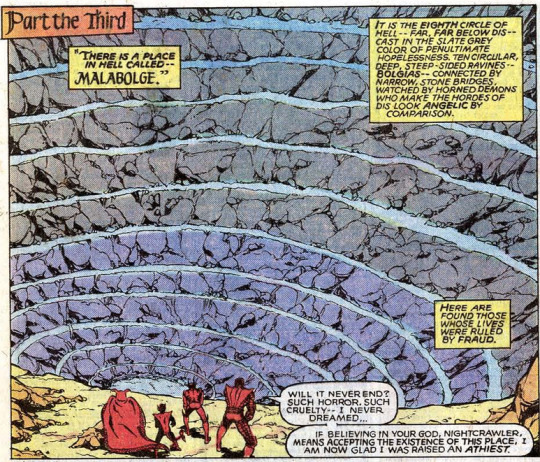
Colossus, standing in actual, physical Hell: "Man, you Christians have some fucked up ideas; I'm glad I don't believe in any of this shit."
395 notes
·
View notes
Text

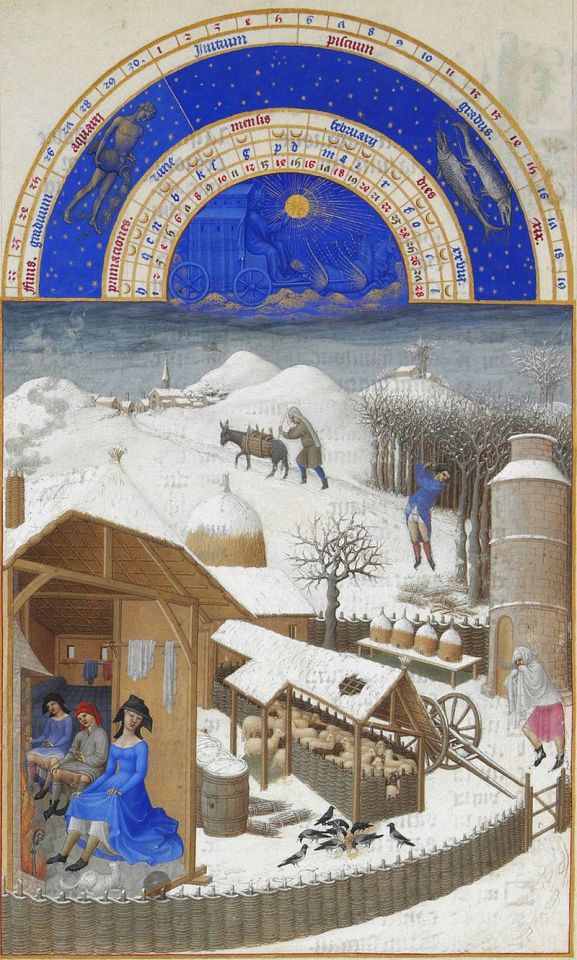

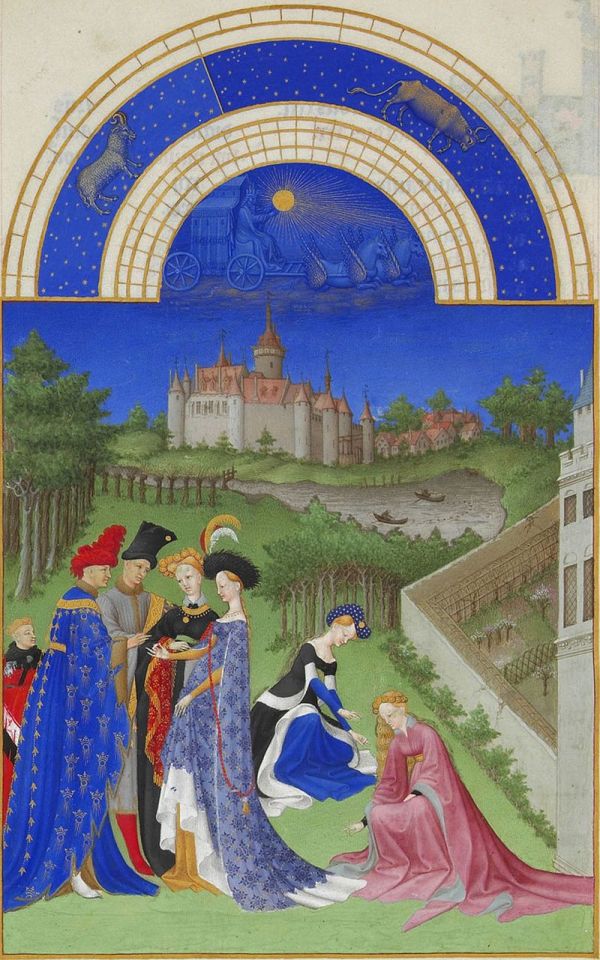



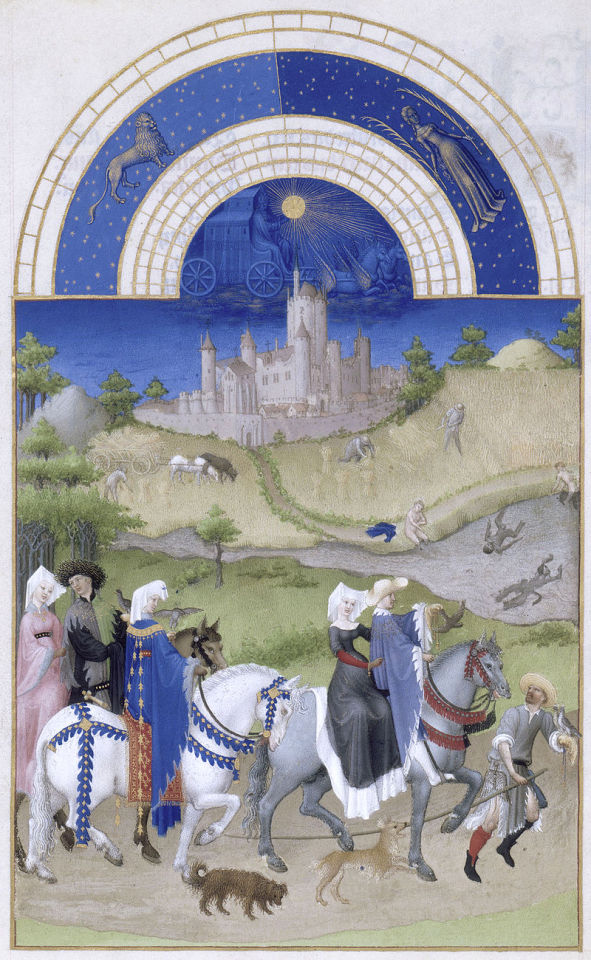
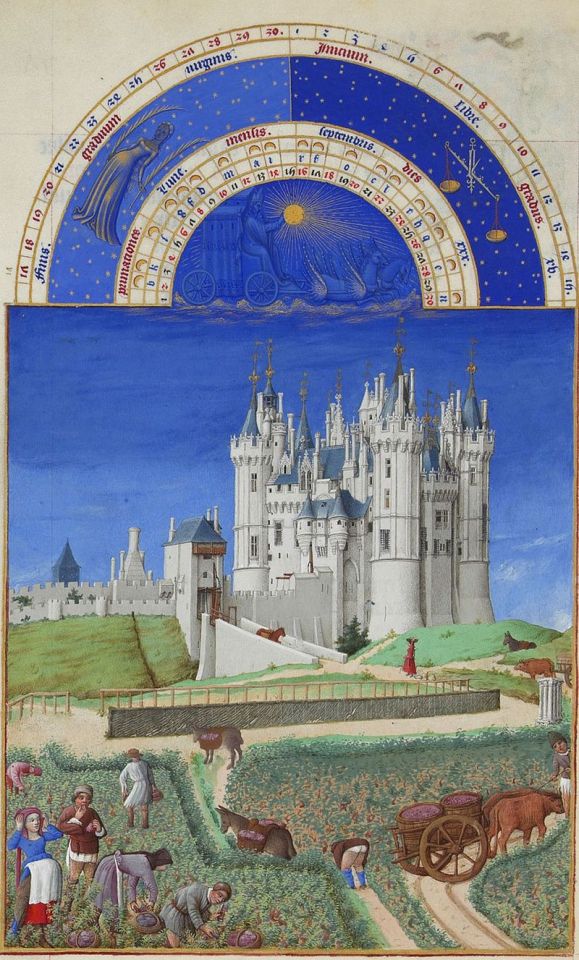


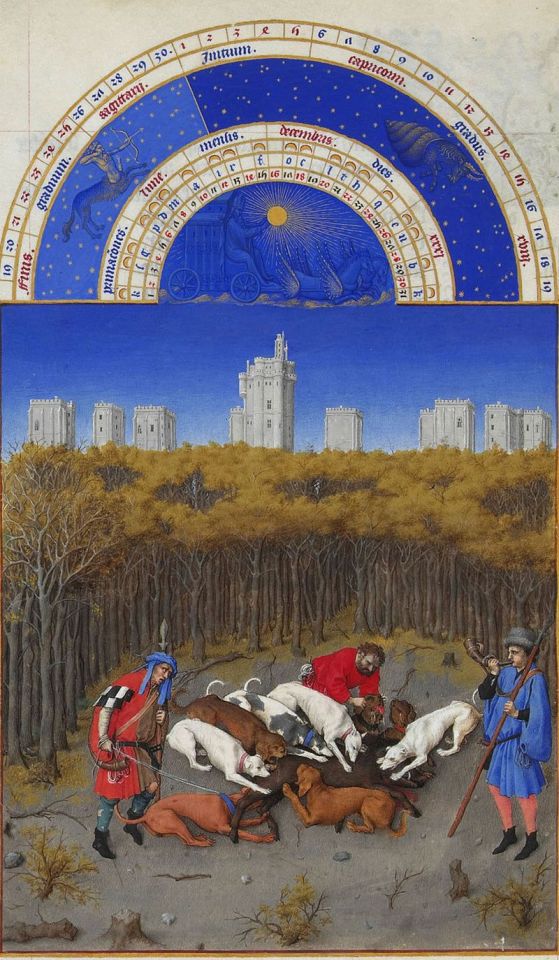
the 12 calendar months featured in très riches heures (c. 1412 and 1416), an international gothic style illuminated manuscript book of hours, pages in order from january to december respectively
1K notes
·
View notes
Text
My favorite part of the Chronicles of Narnia is it's base assumption that children understand the world better than all adults.
3K notes
·
View notes
Text
DECOLONISING D&D

In 2019, after seeing yet another round of alarmist discourse in Xwitter about how Dungeons & Dragons is FULL of COLONIALIST tropes and patterns, and needs to be revised, SCRUBBED of its PROBLEMATIC FILTH---I rage-tweeted this brainfart:
"Decolonising D&D"
I've seen this thread round the community, since. Humza K quotes it in Productive Scab-picking: On Oppressive Themes in Gaming. Prismatic Wasteland quotes it in Apolitical RPGs Don't Exist. Most recently, it was referenced in a 1999AD post about Western TTRPGs (an interesting discussion on its own merit; one that already has a counterpoint from Sandro / Fail Forward.)
If folks are still referring to it five years later, maybe I should give the thread a little more credit? Perhaps the fart miasma has crystalised into something concrete.
In the interest of record / saving this thought from the ephemerality of Xwitter, here is the text in full, properly paragraphed, and somewhat more cleanly expressed:
+++
"DECOLONISING D&D"
Firstly: saying "D&D is colonialist" is similar to saying: "the English language is colonialist".
If your method of decolonising RPGs is to abandon D&D---well, some folks abandon English; they don't want to work in the language of the coloniser. More power to them!
For those who want to continue using the "language" of D&D---
Going forth into the "wild hinterland" (as if this weren't somebody's homeland);
to "seek treasure" (as if this didn't belong to anybody);
and "slay monsters" (monsters to whom?)
Yeah. There's some problematic stuff here, and definitely these aspects should make more people uncomfortable.
But! I think it is an error to "decolonise D&D" by scrubbing such content from the game.
That feels like erasure; like an unwillingness to face history / context; like a way to appease one's own settler guilt.
Do you live in the West? Do you live in any Asian urban metropole? White or Person of Colour(tm)---you are already complicit in colonialist / capitalist (yes, of course they are inextricably linked) behaviour. (I can't speak for urban metropoles elsewhere, but I bet they are similar centres of extraction.)
Removing such patterns from the TTRPGs you play might let you feel better, at your game table. But won't change what you are.
I think it is more truthful and more useful NOT to avert one's eyes from D&D's colonialism.
The fact that going forth into the hinterland to seek treasure and slay monsters is a thing, and fucking fun, tells us valuable things about the shape and psychology of colonialism. Why conquistadors in the past did it; why liberal foreign policy, corporations, and post-colonial societies do it today.
Speaking personally:
I write stuff that evokes / deals with the context I'm in---Southeast Asia. An intrinsic part of that is looking at the ways colonial violence has happened to us---as well as the ways / reasons we now, supposedly free, perpetrate it on others.
A long chain of suffering. Heavy stuff.
I also write for people who want to have fun / kill monsters / pretend to be elves, of course. But for those people who want to consider serious stuff like colonialism: I offer no FIGHT THE POWER righteousness, no good feeling, no answers.
Only discomfort. Because the truth is uncomfortable.
Here's a screenshot of the Author's Note for Lorn Song of the Bachelor:
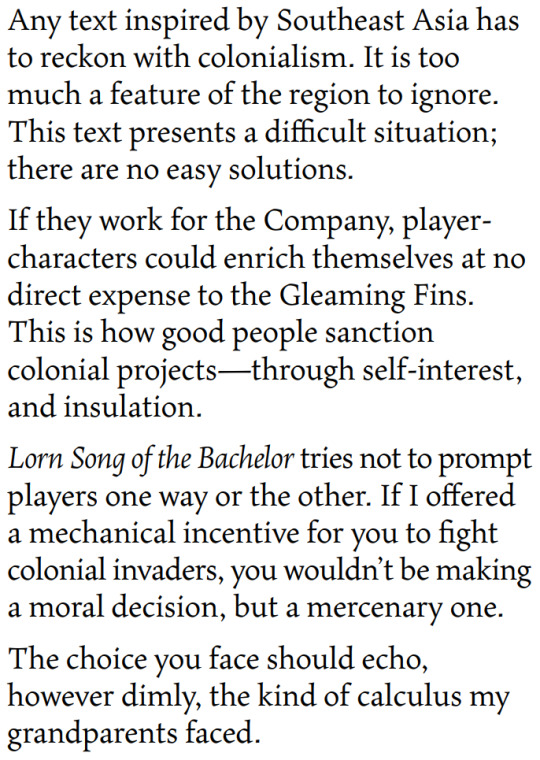
"Any text inspired by Southeast Asia has to reckon with colonialism ... This text presents a difficult situation; there are no easy solutions.
"... If I offered a mechanical incentive for you to fight colonial invaders, you wouldn’t be making a moral decision, but a mercenary one.
"The choice you face should echo ... the kind of calculus my grandparents faced."
I stand by that.
Also: might we be more precise and more careful about using the term "decolonising", please?
Here I quote Tuck and Yang's landmark and (sadly) still trenchant "Decolonization is not a metaphor":
"Decolonization brings about the repatriation of Indigenous land and life; it is not a metaphor for other things we want to do to improve our societies ..."
+++
Further Reading
So this post isn't just me reheating a hot take, here are some touchstone writings from around the TTRPG community about colonialism as a subject and mode of play in games:
+
"Jim Corbett was called upon to hunt down another fifty maneaters over the course of the next 35 years. Together, those tigers had killed over 2000 people, for much the same reasons as the Champawat Tiger - injury, desperation, starvation, and habitat loss.
Would you look at that.
The root cause was British colonialism."
D&D Doesn't Understand What Monsters Are
from Throne of Salt
+
"Another effect of having colonizers in my setting would be giving players the opportunity to drive them away from the islands, their home. This maybe just be for the catharsis. After all, isn’t catharsis a big part of why we play roleplaying games?"
I’m Adding Colonizers To My Setting
from Goobernut's Blog
+
"When you have a slime boy and the other characters are a really fat lizard and one's playing Humpty Dumpty, it completely shatters the straight-faced serious authoritarian illusion of race, and replaces it with complete fucking nonsense. I love the idea of proliferating the number and types of "races" into absurdity, to the point where the entire logical structure of it collapses in on itself and race as a category ceases to become coherent or meaningful in any sense."
Interview with Ava Islam - Designer of the RPG Errant
from Ava Islam / The Lost Bay
+
"Perhaps most critically, the fundamental basis of power is not land or even money but manpower. That’s what local rulers fight over, and what Chinese commercial networks export, in return for unique island products. It’s what the European colonists really need (even if it’s not what they most desire). There is rich loot to be grabbed in the form of spices, Spanish silver, Indian gold, sea cucumbers (the Chinese love ’em), perfumes, dyes, cloth etc. so there’s ample opportunity for piracy, trade and smuggling, but the key to long-term success – the key to independent survival – is nakedly and unquestionably uniting people."
Counter-colonial Heistcrawl: previous high scores
from Richard's Dystopian Pokeverse
+
"They worked their own land—which they dispossessed from American Indians—or became small shop owners or opportunistic gold diggers or bounty hunters or itinerant ranchers. To me, substituting these situations for one ruled by industrial monopoly ignores that the Wild West is a perfect example of how capitalism operates outside of (or prior to) mass industry, instead being composed of self-employers and self-sustainers."
Fantastic Detours - Frontier Scum
from Traverse Fantasy / Bones of Contention
+
"... using the Western framing and D&D's baked-in imperialist and capitalist structure to get people earnestly participating in the experience of forming imperial power structures and the early roots of regional capitalism ... The PCs aren't the drifters on the train or the townsfolk watching with apprehension - they're the railroad itself."
An Arrow for the General: Confronting D&D-as-Western in the Kalahari
from A Most Majestic Fly Whisk
+++
795 notes
·
View notes
Text
Level one dungeon crawl
Once more we return to the old tradition: the first Monday of the month shall be level one night. On Monday we’ll be at The Black Dog on whyte ave by 730, either on the front stage area or upstairs if it’s too busy. Come play a lil old school d&d with us, no prep required.
0 notes
Text
Vampires and level drain
Unlike other undead, the level drain inflicted by a vampire’s bite can be reversed. If the monster thinks it’s in their interest—failing a morale roll as a fight turns for the party, or because of some other motivation—it might offer its own blood to the afflicted. Not before they complete some task or pay some other price of course, and perhaps it will give the first level easily and the second much less so. Any character who has tasted the blood of the vampire to regain a level is marked with a geas: they will turn when they die.
0 notes
Text
In Praise of Random Encounters
I'm in my "responding to frequently asked Reddit r/rpg questions" phase, so please allow me to defend the random encounter. This post is in response to everyone who goes, "Why do people use random encounters? They interrupt the flow of the story, and it doesn't make any sense to have something randomly show up and fight."

Did you know there was a Pokemon named after me?
In this post, I will argue against these strawmen, make a case for random encounters in certain games, and describe my favorite random encounter situations from my own games.
This disputation against random encounters can be broken up into three parts:
they interrupt what is already going on ("the story")
they are illogical
they're automatically a fight
I'm going to address these last to first.
Random encounters shouldn't jump right into fights. If used as intended, they come with an encounter distance, meaning sometimes you just see signs of the encounter, or you spot them from far away. And they should also come with what used to be called a reaction roll, which dictates how the encounter feels about the PCs. These were rolled on 2d6, which meant there was a bell curve that favored results in the 6-8 range, which were usually something like "wary" or "neutral."
Second, the logic of random encounters. If you're using them right, random encounters should make sense. They should only have a chance of happening in places where the encounters could be, and encounter tables ought to be chosen based on location. So you won't get a dire trout in a desert or whatever.
This last bit is the hardest one. If it feels like a random encounter would disrupt "your story," you're probably running a game whose underlying philosophies are opposed to random encounters, yes. It's probably also opposed to many other frameworks that were present in traditional/old-school rule sets. If your game has a pre-planned story or plot, if that plot requires a certain pace or order, and if the injection of outside elements would disrupt that plot, you probably shouldn't use random encounters.
(You also shouldn't use D&D or its cousins. You might also not want to have other players, since they can disrupt those plots. But that's just me being petty.)
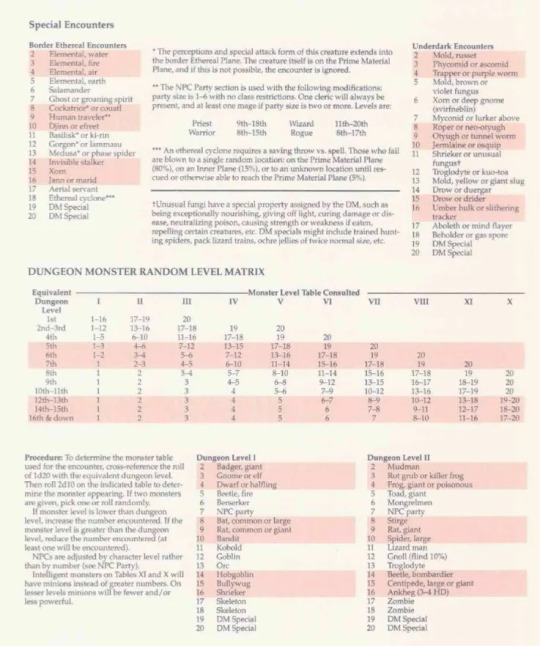
A page of random encounter rules from Advanced Dungeons & Dragons. This is a shitty example. I promise it's easier than this.
So when SHOULD you use random encounters? Use them if the game you're running is attempting to simulate a world that has its own logic and background that is not dependent on the player characters. Random encounters help show that the world is in motion at all times and that people and creatures move about of their own volition. They don't show up when it's meaningful to the plot or the other characters; they wander. They're random.
Another key component of this style of gaming is that they usually consider story as something that emerges from or comes after play. "Remember how we tried to cross the raging river full of electric eels, and you dropped your sword, and I almost died, but we made it across? That was awesome." These things didn't happen because they were important plot points predicted by the DM; they are the results of rolls at the table, rolls that are honored in their immediacy and only made sense of after the fact. Does this mean that you risk having a disjointed mess from which no pleasing story can emerge? Yes! But you also risk having a story emerge that no one could have planned, that is equally surprising and pleasing to everyone at the table.
This emergent storytelling is probably the greatest joy of the random encounter. Don't approach the encounter with, "It doesn't make sense that a goblin would be here." Instead, adopt the attitude of, "Let's figure out why this gobllin would be here." (And while you're at it, use that same attitude toward books you read and movies you see.)
A related aside: in some play cultures, the DM is considered to be someone who plans everything out and slowly reveals bits of story as rewards to the other players. As a DM, this can feel really stagnant, and it can be a lot to keep track of, and there is far less joy of surprise. Using dice at the table to introduce new elements can bring some of that fun back to the DM.
Everything I've said so far is a synthesis of dozens of rulebooks and blog posts I've read across a decade of running games, so please allow me to introduce a final element: my own experience with the joy of random tables.
In 2014, when 5E was coming out to great demand on the backs of Stranger Things, Critical Roll, and The Adventure Zone, I started running a campaign for friends and coworkers. There was no developed play culture around 5E at the time, no cottage industry of third-party developers. So in running it, I was drawing on what I had been reading for years: old-school roleplaying and story games.
So I prepped my starting town (doing way more work that I would today), including random encounter tables for the area. And when the players were out searching for some ruins and getting lost west of town, I rolled a random encounter. It was some gnomes. All the gnomes here had escaped from a gnome hell for greed, so they weren't exactly kind. And their reaction roll was just south of neutral, so they were a little surly.

A bad screenshot of my "west of the town of Wall" encounter tables.
They led the players to the ruins and waited, trying to trap them inside after they'd been run down by the undead inside. But the players overcame the trap and told the gnomes off. (They didn't want to get in another fight after going through the ruins; more emergent storytelling.) So the gnomes ran off, but they would remember this.
Flash forward to a different session. In the main mega-dungeon under the town, the players were exploring a new area. Another random encounter: the devil of gnome hell! It was a giant mole with masses of earthworms for limbs, and it was searching for its escaped prisoners. It threatened to kill the PCs unless they gave it a magical item. So Pepper the elf gave up his winged sword, which he'd found in the aforementioned ruins. He loved that sword.
And here's where it all comes together. The gnomes were trying to settle the land west of town, but the humans had a fort there. The players were going to that fort to get some information about the faerie realms. How could I show this situation in a way that would, as succinctly as possible, illustrate the tension while giving the players a choice on who to join? Well, the gnomes would be attacking the fort. This normally wouldn't be much of a battle…but the vengeful gnome from the ruins had made a deal with the gnome devil for power. And now he was wielding Pepper's sword, using it to fly over the fort walls and attack.
Pepper was pissed! He wanted his sword back! The other players were more interested in figuring out a way to stop the ongoing conflict between gnomes and humans. And the gnomes were split between wanting to peacefully settle their new land and get revenge on the players for driving them off from the ruins. Who would prevail?
I hadn't planned a story, but I had created a situation a story was likely to emerge based on the players' actions and the results of the dice.
Conclusion
This isn't me saying this is the only way to play. It's not the only way I play. In a short one-shot or a tightly paced, emotional game, I would never use random encounters. But they can be fun! And they (and their associated suite of rules) can address some of the issues that lead to DM burnout and genre predictability.

If you find me in the wilderness, I will fight you.
296 notes
·
View notes
Text
BLOGGIES 2023 THEORY WINNERS
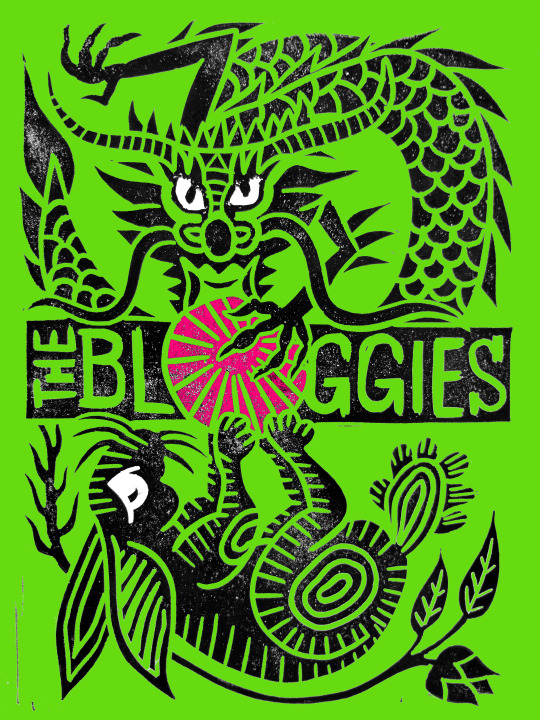
A week of voting has passed, and the results of the final round are in. We have our winners for the BLOGGIES 2023 Theory category.
And now: winner announcements, medals, acceptance texts!
(I asked the winners to say a few words about their winning work---where they were at when they wrote the posts; whether they have additional insights; how they feel about winning. These texts were edited only to remove thanks to me, which all did, but I am shy about, since these are being posted on my blog ...)
+++

BRONZE BLOGGIE FOR THEORY POST:
🥉 being a problem - playable orcs at the limits of humanity 🥉
from A Most Majestic Fly Whisk
Ènziramire:
Wrote this while putting my nieces to sleep (exhausted by the Pete the Cat incident mentioned in the post) and they helped me pick the Marshall painting so it's only fitting that I name Ms. Amaya and Ms. Malia as my co-authors. Race / orcs talk will probably be bad forever, or at least as long as the hobby is structured this way, but a benefit of The Discourse's remarkable ability to trivialize and misinterpret is that it illustrates the flaws of liberal incorporationism in a manner seldom achieved by other critical traditions. I'd like to thank Sylvia Wynter and white guilt for this bronze medal.
+++
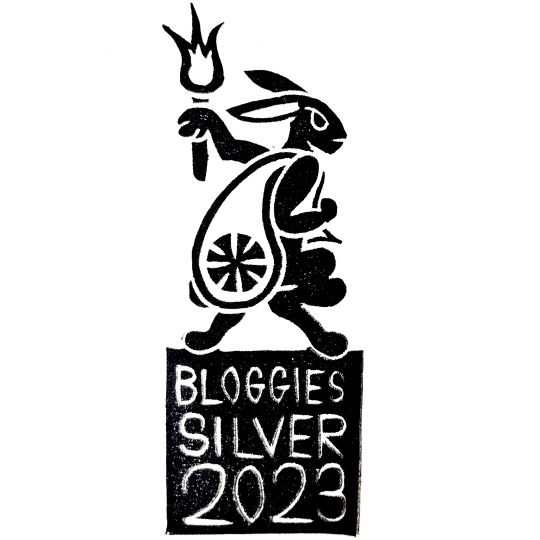
SILVER BLOGGIE FOR THEORY POST:
🥈 Critical GLOG: Base Resolution Mechanics 🥈
from Goblin Punch
Arnold K:
I see no reason why tabletop RPG systems shouldn't be as customizable as the characters; the hobby would very much be enriched if they were.
Certainly there is interest--DMs are continually generating their own small hacks, but only the most adventurous are writing their own systems. The largest obstacle is a lack of familiarity with system design. People may know what they are trading when they sacrifice Dex in favor of Con, but the pains and joys of trading d20 resolution for a highest-in-a-dice-pool are still clouded.
If I have been able to empower even one person to design their own system--the last push that they needed--then the blog post has been a success.
Thank you everyone who voted for me. You guys fucking rock.
+++

(In lieu of a medal, Gold winners will get a linocut print; here's a sketch of the design inspired by Marcia's post: a dragon intertwined in / strangled by a banyan's branches and roots.)
GOLD BLOGGIE FOR THEORY POST:
🥇 OSR Rules Families 🥇
from Traverse Fantasy
Marcia B:
Zedeck asked me to say a couple words about this post, so I figured I'd say that (although I'm not sure how many people voted one way or another) I haven't been satisfied with its reception in general. It's been read as a neutral feat of statistics, a basis for taxonomic discourse, or a celebration of the OSR.
As the author I'm obviously dead, but as a fellow reader I'd like to suggest an alternative interpretation: there is so much collective effort spent on making books of rules that are ultimately formal and predictable permutations of each other. Only a few of the books originated rules that would then be incorporated into many of the other books.
Maybe it's that game designers aren't that creative; maybe it's that authors prefer to write systems over adventures; maybe it's that hobbyists feel pressured to systematize and christen their house rules. You can argue for one or more of these angles, each one representing a lens through which to criticize and re-envision the hobby. Whichever lens you prefer, though, I think they are all preferable to seeing no problem at all.
That being said, I am glad that for some people it helped them find a ruleset that works for them, or to just know what's out there. I hope this spurs us to find new ways to (literally, i.e., mathematically) break the norm.
+++
Congratulations everybody!
(Special thanks to Martin / Sharkbomb for his assistance tidying up the medal graphics; I dunno how to photograph art properly ...)
22 notes
·
View notes
